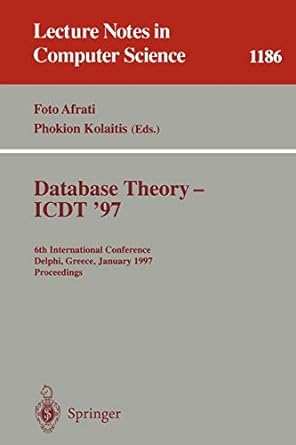Question
Please help me with this question. I would really appreciate it. Please explain briefly I am trying to prepare for a test. Consider the following
Please help me with this question. I would really appreciate it. Please explain briefly I am trying to prepare for a test. Consider the following relational database to manage concert and ticket sales. The relations are artist, concert, venue, seat, ticket, and fan. The schemas for these relations (with primary key attributes underlined) are:
Artist-schema = (artistname, type, salary) Concert-schema = (artistname, date, venuename, artistfees) Venue-schema = (venuename, address, seating_capacity) Seat-schema=(venuename, row, seatnumber) Ticket-schema = (fanID, date, venuename, row, seatnumber) Fan-schema = (fanID, name, address, creditcardno)
Where: --> artistname is a unique name for the artist (because of trademark/copyright rules no two artists have the same name). --> type is an attribute whose value is chosen from music, comedy, juggling, or other --> artistfees is a real number greater than 0 --> fanID is a unique ID given to a customer --> creditcardno is a 16 digit credit card number starting with a 4 or a 5
QS) Why would a foreign key in ticket referencing venue NOT provide any additional constraints? Answer briefly.
Step by Step Solution
There are 3 Steps involved in it
Step: 1

Get Instant Access to Expert-Tailored Solutions
See step-by-step solutions with expert insights and AI powered tools for academic success
Step: 2

Step: 3

Ace Your Homework with AI
Get the answers you need in no time with our AI-driven, step-by-step assistance
Get Started


